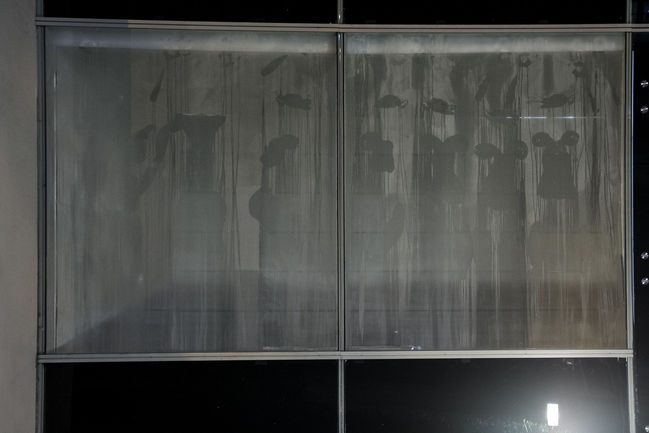VARGAS
Eden
Installation
2020
We see, from outside, the cloudy window. The condensation generated by some circumstance beyond our understanding makes it difficult to know what happens inside. We don't see any bodies, but the surface of the glass sweats. Or maybe cry. Why would he have to sweat a glass or what would be his reasons for crying? When in doubt, these two possibilities are combined which, in any case, should indicate the presence of a body in the face of the hope or fear implicit in the fact of seeing the vapor condensing in an interior space, since sweating and crying are bodily processes that they define a limit, an effort or a sacrifice. We sweat because we work, we cry because we condense some emotion. We are present every time the body bathes in sweat, every time a tear escapes us, because you don't sweat or cry on someone else's body. I sweat because I am and I cry because I exist. However, here we only see the conversion of steam to water, the entropic transformation of matter. The heat of the universe tends to be distributed evenly and, as time goes by, the temperature levels off looking for absolute zero, like passions that sooner or later dissolve, leaving only a trace: ink diluted by the drop that falls on a letter, the scar that tells us that the body was broken or torn at some point and that it healed, since the dead do not heal, or the small channel that was opening a trickle of water that drips on a dusty surface. That day, life no longer hurts or disturbs us and we are able to see the beauty of that map of marks, passions and pains that, finally, we have stopped suffering.
If we pay close attention to this window, we will also see that the alternating lights that come from inside also allow us to see other body marks fixed on the transparency: someone touched that surface, transferred heat and fat, made contact, left evidence of a pressure. That someone is no longer there, but his body is still present, resisting being completely absent.
We ate from the tree of knowledge and thus we invented death, reproduction and mourning, all burdens that have written human history. Our children are the product of our sweaty copulating bodies, our dead are the certainty of an absence that manifests itself in tears. There was neither death nor copulation in Eden.
By inventing birth and death, we also invent desire and phantasms, both ferments that project the life of the body backwards and into the future in always intricate ways. Sweat and tears are family history, lineage, family, the plea not to die alone without leaving a mark on the world. All beauty and all horror are made of these primordial waters, of this mist that by force of density materializes in indecipherable drops, initially empty of meaning, but always ready to be charged with our particular passion.
In an empty hotel, in a city full of commercial premises that no longer contain any type of human activity, in the branch of heaven or paradise lost, surrounded by many other windows where everything is rented and where nobody rents anything anymore, a woman begins to cry or sweat to give life to some ghosts of the present that no longer seek to transcend but continue to say: “here we are”.
Víctor Albarracín Llanos





